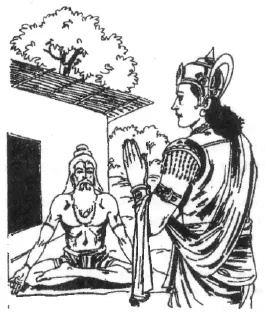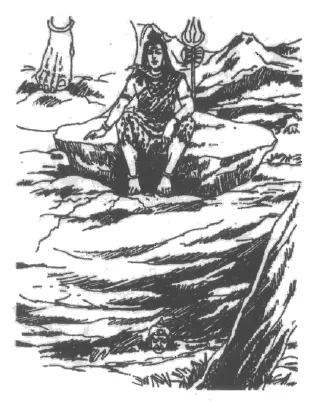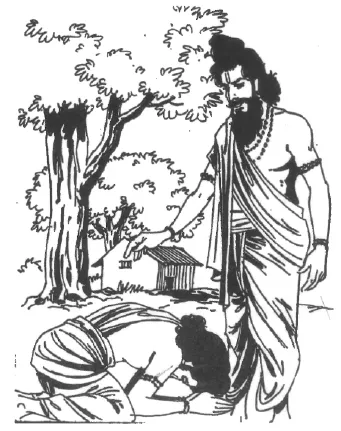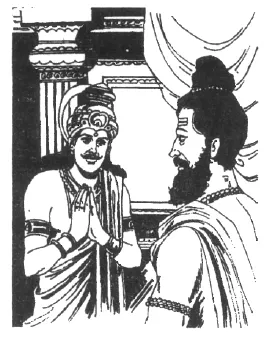
eBook - ePub
Tales From the Vedas & Other Scriptures
Dr. B.K. Chaturvedi
This is a test
Share book
- English
- ePUB (mobile friendly)
- Available on iOS & Android
eBook - ePub
Tales From the Vedas & Other Scriptures
Dr. B.K. Chaturvedi
Book details
Book preview
Table of contents
Citations
About This Book
Vedas are the ancient tomes of Hindu religion which are the treasure troves of the values of an ideal life. Various tales given in the Vedas and other Scriptures give a detailed account of the origin of universe, man, nature, animals, Brahm, God, ages, society, culture, sin and virtues, life and death, king and subjects, planets and Nakshatras, dissolution of the world, etc. The Vedas are a storehouse of knowledge. Even a small Mantra, though consisting of a mere few syllables, shows unfathomable depth and vastness of the universe. This book has been prepared by culling some tales from these very precious gems of divine learning.
Frequently asked questions
How do I cancel my subscription?
Can/how do I download books?
At the moment all of our mobile-responsive ePub books are available to download via the app. Most of our PDFs are also available to download and we're working on making the final remaining ones downloadable now. Learn more here.
What is the difference between the pricing plans?
Both plans give you full access to the library and all of Perlego’s features. The only differences are the price and subscription period: With the annual plan you’ll save around 30% compared to 12 months on the monthly plan.
What is Perlego?
We are an online textbook subscription service, where you can get access to an entire online library for less than the price of a single book per month. With over 1 million books across 1000+ topics, we’ve got you covered! Learn more here.
Do you support text-to-speech?
Look out for the read-aloud symbol on your next book to see if you can listen to it. The read-aloud tool reads text aloud for you, highlighting the text as it is being read. You can pause it, speed it up and slow it down. Learn more here.
Is Tales From the Vedas & Other Scriptures an online PDF/ePUB?
Yes, you can access Tales From the Vedas & Other Scriptures by Dr. B.K. Chaturvedi in PDF and/or ePUB format, as well as other popular books in Theologie & Religion & Hinduismus. We have over one million books available in our catalogue for you to explore.
Information
Topic
Theologie & ReligionSubtopic
Hinduismus1. The Gift of Life

This is the story of the great sage Dadheechi, who with his rare act of philanthropic charity stands unparalleled in the mythological history of the world even today. He had donated his sturdy bones in the making of the powerful thunderbolt (vajra) for the sake of the security of the divine chief Indra and other deities.
Once Indra, obsessed with the idea of being the master of the three realms (triloka) refused to give due respect to the divine priest Brihaspati. His arrogance led him to believe that he was superior to all humans and sages, being the chief of all deities. When Brihaspati visited Indra, he (Indra) refused to give the learned sage his due respect. Brihaspati left the court without making an issue, but all the other gods were aghast at the contemptuous behavior of their chief. They explained their chief the felony he had committed and reprimanded him for his behavior towards the great sage. By the time Indra realized his mistake, Brihaspati had left his realm. Indra searched for him in all directions, but in vain.
Sage Brihaspati was the leader of all religious rituals and Yagyas, the oblations of which empowered the gods. His absence stopped all rituals and Yagyas which made the gods lack their charismatic powers. This gave the demons an opportunity to wage a war against their arch enemies. Their guru and mentor, Shukracharaya, commanded them to attack the deities. The already weakened gods were no match for the ferocious demons who easily won the battle and captured heaven.
Defeated and disgraced, Indra with his divine hosts approached Lord Brahma for guidance and protection. Brahma advised them to go to Vishwaroopa, the worthy son of Sage Twastha, a learned man. He told them to appoint him as their guru and have the rituals completed in order to get back their lost strength.
Vishwaroopa agreed to help the deities. He guided the rituals and performance of Yagyas to restore the lost powers of the gods. But Vishwaroopa’s mother belonged to the demon race and hence he secretly helped the demons as well. When Indra came to know about this, he was furious with anger. In a fit of rage, he beheaded Vishwaroopa while the latter was busy studying the vedas. As a result, Indra was charged with one of the most deadly sins of slaying a Brahmin, i.e. Brahma Hatya.
The burden of this sin made Indra lose all his powers and his comrades also shunned him. The pitiable state of Indra thawed Brihaspati s heart with compassion and he appeared before Indra. Overwhelmed with remorse, Indra begged for mercy and the noble sage forgave him. Thereafter, Brihaspati conducted the necessary rituals and Yagyas to empower the gods. The sin of Brahm-Hatya was dispersed among the water, earth, trees and women. Thus, Brihaspati helped Indra regain his throne and divine powers.
On the other hand, when Twastha Rishi heard about the slaying of his son by Indra, he was infuriated. To avenge the death of his son, he used his powers to create a powerful demon Vrittasura, and made him chase Indra with the intention of killing the divine chief. Vrittasura’s might pulverized the gods, who once again had to seek Brahma’s help. Lord Brahma suggested that if they could bring the sturdy bones of the mighty sage Dadheechi, who was in deep penance in the jungles of Namisharanya, they could make a Vajra (thunderbolt) out of them, which could be used to kill Vrittasura. But for doing this, the sage’s consent would be necessary. Therefore, all the gods rushed towards Naimisharanya to meet sage Dadheechi and seek his help.
Sage Dadheechi was Lord Brahma’s grandson and the son of Sage Atharva. He had built his hermitage on the bank of river Chandrabhaga. Once, while giving a discourse to the divine twins, Ashwini Kumaras, on the divine knowledge of Brahm-Vidya, Dadheechi was beheaded by Indra, as he did not want the Ashwini Kumaras to be equipped with the secret knowledge. But the Ashwini Kumaras had replaced the Sage’s head with the head of a horse. This had earned Dadheechi the epithet of “Ashvashira”(one with the horse’s head). Now, Indra stood before the great Sage and eulogized him with songs of praise.
The wise and learned sage Dadheechi patiently heard their woes and not once did he refer to Indra’s previous act of butchery. He told Indra that they may only get his bones after his death and to die at will was very difficult. But, as their request had a noble cause of putting an end to the terror of a demon, Dadheechi agreed. However, the sage expressed his last wish to visit or behold all the holy places of the world. In order to fulfill the Sage’s last wish, Indra made all the holy places reach there in symbolic form. Having seen all the tirthas (places of pilgrimage), the great reverend Sage with his super yogic powers breathed his last for the benefit of the gods and the world. The gods then made a comb with a very sharp-edged tongue and licked Dadheechi’s dead body so that all the flesh and skin from his dead body could be peeled off. Indra then took hold of the great Sage’s bones and made Vishwakarma, the celestial architect prepare the deadly Vajra (thunderbolt), with which he killed Vrittasura and resumed his authority over heaven.
2. The Arrogant Ravana

This is a story of the ten-headed demon king, Ravana, who aroused by his arrogance thought of himself as the most powerful person of the whole world. In order to prove this, he tried to lift the great Mount Kailash - the abode of lord Shiva.
Once, Ravana, an ardent devotee of Lord Shiva, decided to seek a boon from his revered and omnipotent Lord Shiva. He went to Mount Kailash and started observing a severe penance. When even after many years of penance, the Lord did not appear before him, Ravana started hacking off his heads one by one at the feet of the Lord’s abode. Just when he was about to hack off his tenth head, Lord Shiva appeared before him and asked him to ask for his desired boon.
Ravana asked the Lord to grant him incomparable might and to restore his ten heads as before. The Lord replied: “So shall it be” and disappeared. Delighted at receiving his coveted boon, the arrogant Ravana started causing havoc in all the three realms with his demonic powers.
This became a matter of great concern for the gods, who let down by the Lord who had bestowed Ravana with such unassailable powers. The gods then asked Narad, the celestial sage, to come to their rescue and help to reduce the powers of Ravana. Known for his witty means for causing confusion and attaining any desired result, Narad approached Ravana, who was returning from Kailash after receiving the desired boon. Narad called out to him and said “O Demon Lord! You appear to be very happy. Have you received some coveted boon?”
Ravana replied: “I have received a boon from Lord Shiva and now I shall be the most powerful person in all the three realms”.
Narad feigned a surprised look and replied: “From Lord Shiva?! O demon lord! In spite of being so wise and learned, how could you trust the one who is always intoxicated? He does not realize what he says or does. You must check and verify the validity of his boon. You being the mightiest of all kings, you must try and lift the mighty Mount Kailash. Only then will you receive the assurance of your might”.
Thoroughly confused, Ravana returned to Mount Kailash and began to lift it, in order to check the efficacy of the Lord’s boon. As the mount began to rock, Shiva the all knowing, quietly pressed the mount with his big toe. As the mount came back to its position, Ravana was pressed in between the earth and the mount. He writhed in pain and began to chant hymns to placate the Lord. After many years, when Lord Shiva’s anger was placated, he appeared before Ravana and admonished him for his arrogance. He reminded the demon king, that though the boon would make him unassailable, its effect would be short lived and that very soon he would meet someone who would end his (Ravana’s) very existence.
Ravana was confused, but he consoled himself with the fact that he was mighty and powerful as long as his enemies failed to overtake him. Having his mission accomplished, Narad left for the heavenly abode.
This story truly justifies the fact that however strong, learned or powerful one may be, one must never be proud or arrogant about it.
3. The Great Sage Ribhu

Sage Ribhu was one of Brahma’s sons, who never built a hermitage for himself and moved freely throughout the earth. Once, while passing near sage Pulastya’s hermitage he saw sage Pulastya’s son, Nidadya, busy in the study of the Vedas. On seeing Sage Ribhu, Nidadya came close and bowed to him reverently. Pleased with the courteous boy, Sage Ribhu told Nidadya that the real knowledge of life was the knowledge of the ‘Self’. He asked Nidadya to acquire that knowledge, without which all knowledge was meaningless. He told Nidadya to meditate and attain the realization of the ‘Self’. When Ribhu left, Nidadya, went and told his father about all that had transpired.
After some time, Sage Pulastya had his son’s marriage duly solemnized. Nidadya, now a family man, finally built a small hermitage for himself on the bank of river Devika, near Veernagar and lived there happily.
One day, Sage Ribhu went to meet Nidadya at his hermitage. A long time had elapsed since their last meeting and hence, Nidadya failed to recognize the great Sage. But, like a cultured host, he treated his guest with all due respect and fed him well. Then Nidadya asked the great Sage as to where he was heading, where was his hermitage and if he was content with the food offered. To all these questions, Ribhu replied: “O Nidadya! It is Pran (life force) that feels the hunger, so how do I justify whether my Pran is satisfied or not? Remember that our soul or Pran is different from our mortal being. You and I are beyond it. Sometimes the Pran gets satisfied and sometimes it is not. One must try to grow above all physical necessities. It is these necessities or the process of fulfilling these necessities that creates an infatuation or aversion for them. In this process, people forget that our life is beyond the physical existence. One must try to overcome these mundane, materialistic needs.” Nidadya was enlightened by the sage’s words and fell at his feet. Sage Ribhu raised Nidadya, blessed him and accepted him as his disciple. Taking his leave, Sage Ribhu left his hermitage and thus, some years elapsed.
One day, the king of Veerapur was passing by his hermitage and hence a big crowd had gathered there. Suddenly, Sage Ribhu also reached there and spotting Nidadya close by, asked what the commotion was all about. Nidadya told him that the king was passing through with his entourage. Sage Ribhu asked Nidadya, “Can you distinguish between the king and the common man?” Nidadya replied: “The one riding the elephant is the king and the rest are common men.” Ribhu asked: “Now tell me what is that which marks the distinction between the king and the elephant. How can you say that who is above and who is underneath?” Perplexed and confused, Nidadya looked at the sage and then with one leap, ascended on Ribhu’s shoulders and said, “I am the king as I am over you and you are the elephant as you are beneath me”.
Undeterred by Nidadya’s act, Sage Ribhu said: “All right! I accept the distinction that the one on top is the king and one below is the elephant. But can you identify who you are and who am I?” Nidaya realized his mistake, immediately came down from the Sage’s shoulders and duly apologized, humbly falling at his feet. The Sage raised Nidadya and said, “No son! You have not committed any mistake. If a fruit happens to drop on the head of a passerby, is it a sin of the tree? Forget about it. I just wanted you to realize that all living beings are one. It is the mundane definitions that define us as superior or inferior to each other.”
Impressed with his metaphysical insight and forgiving attitude, Nidadya hymned the sage and received divine knowledge from the learned Guru. Owing to his forgiving nature, Sage Ribhu came to be known as Ribhukshananda and was treated at par with Brahma in regard and respect.
4. A Selfless Sin

This story justifies that a sin committed for ensuring public welfare is pardoned by the Almighty. Once, King Romapada’s kingdom of Angesh faced a severe drought. The lack of rains dried up all the ponds, rivers and other water resources. Men, women, children, animals and plants, all died in huge numbers due to thirst and starvation. King Romapada failed to find a solution to the problem and thus decided to consult the Brahmins.
The wise Brahmins told the king that the drought was a curse by the heavenly gods. As a remedy they suggested, that if a pious and noble person visited their kingdom they would attain redemption from the curse. Hence, they suggested the King to invite Rishyashranga, the son of the great Sage Vibhadandaka, known for his piety and gullibility.
Thereafter, the King started thinking of ways to entice the young sage to visit his capital. At last, he decided to send a team of the most beautiful danseuses of his kingdom to entice and cajole Rishyashranga in such a way that he would be tempted to visit the capital. The danseuses made a plan in connivance with the state authorities. A beautiful hermitage was built close to the outskirts of the capital. Many shrubs and trees were planted around the hermitage and a variety of animals like deer, rabbits, peacocks and various other birds were kept there. A small canal was also constructed which was connected to the river that passed near sage Vibhadandaka’s hermitage.
Then, riding a beautiful boat, the danseuses happened to reach the Sage’s hermitage. Since the sage was away from the hermitage for his rituals of bathing and worship, only his son Rishyashranga was there. Tying the boat on the bank, one of the danseuses took the form of a young student and entered the Sage’s hermitage. When Rishyashranga enquired about the visitor, the student introduced himself as a “brahmachari” from a nearby hermitage. The danseuse, disguised as a student, offered him a garland and some fruits. They talked for some time, but when the danseuse realized that Sage Vibhadandaka would be back any moment, she took his leave. Before leaving the hermitage, she extracted a promise from Rishyashranga that he would also visit her some day.
Brought up in strict rules of celibacy under the discipline of his father Vibhadandaka, who thought that female association would pollute his son’s piety, Rishyashranga had not met any woman before. He was immensely bewildered and delightfully attracted by the student’s charms and manners. He was still in a state of stupor when Vibhadandaka returned. Seeing his son clad in garlands of flowers, the sage understood that someone had visited his son to make him lose his piety. Although he searched for the intruder and enquired from his son, he failed to find anyone. The sage realized that someone was out to seduce his son for an ulterior motive and thus, he became more vigilant towards his son.
Very soon, the sage had to go out for a month to perform a ritual. Before going out, he warned his son to remain vigilant and to perform his religious duties sincerely.
Meanwhile Rishyashranga longed for the company of the student whom he had found immensely enjoyable. As the state’s sleuths reported to the chief of the danseuses that Vibhadandaka would be away for a month, she decided to put her plan into action. This was just the occasion she was waiting for. The most beautiful danseuse adopted the form of a ‘brahmachari’ and set out in a boat towards Rishyashranga’s hermitage. The innocent and gullible Rishyashranga was in no time charmed by the danseuse and accepted her proposal to visit her hermitage. Seated in the boat, the danseuse in the guise of a student rowed the boat carrying both of them towards Angdesh’s capital. As the boat entered the Kingdom’s territory, rain poured down in streams, and the entire kingdom danced with joy. King Romapada was delighted that his mission had been accomplished. Rishyashranga was taken to the palace and treated lavishly. But the king thought in his heart: “What if sage Vibhadandaka learns of the trick we have played to entice his son to come to our capital? He will curse us and reduce the entire state to ashes.” So in order to tie Rishyashranga permanently to his capital, he even had his daughter married to him.
On the other hand, when Vibhadandaka ret...